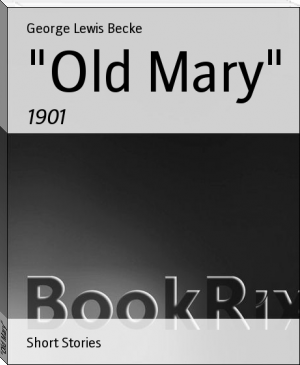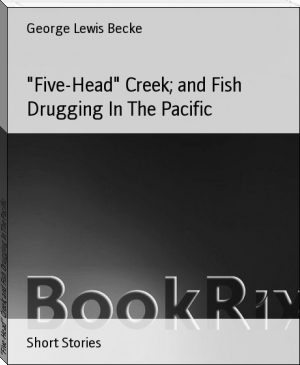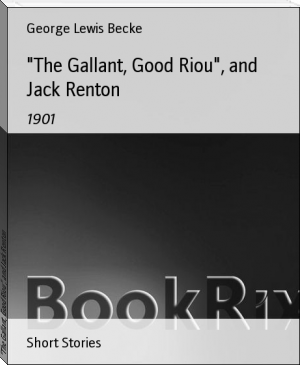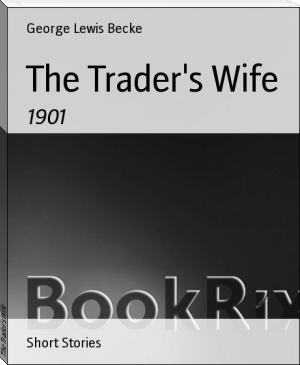"Old Mary" by George Lewis Becke (free ebook novel .txt) 📕

- Author: George Lewis Becke
Book online «"Old Mary" by George Lewis Becke (free ebook novel .txt) 📕». Author George Lewis Becke
helped him, and when the bags were safely covered up he turned to me with a smile lighting up his brown face.
"'There, Molly. That's done, and if Mr. Skinner has to strike, and the Frenchmen come here, they'll get nothing but ourselves.'
"By this time it was well on towards the afternoon, and we only heard a cannon shot now and then. Then the sound of the firing ceased altogether. We got back to the house and waited--we knew not for what. Poor Mrs. Rossiter, who was a very big, stout woman, had sobbed herself into a state of exhaustion, but she tried to brace herself up when she saw us, and when Robert Eury told her that he had buried the money, she thanked him.
"'Try and save it for my children, Robert I fear I shall not be long with them. And if I am taken away suddenly I want you to bear witness that it was my husband's wish, and is mine now, that Mary here is to share alike with my son Fred and my daughter Ann. Would to God I had means here to write.'
"Robert tried to comfort her with the assurance that all would be well, when as he spoke we saw a sight at which I, girl of twelve as I was, was struck with terror--the two French ships appeared round the headland with the _Britannia_ following with French colours at her peak. The three came in together very slowly, and then dropped anchor within a cable's length of the beach. The captain's wife looked at them wildly for a moment, and then fell forward on her face. She died that night.
"The two French captains treated us very kindly, and they told Robert, who spoke French well, that Mr. Skinner had made a most determined attempt to board the larger of the two vessels, but was killed by a musket-shot, and that only after thirty of the _Britannia's_ crew had been killed and wounded, and the ship herself was but little more than a wreck, did Ohlsen, who was himself terribly wounded by a splinter in the side, haul down his flag. Then the elder of the two Frenchmen asked Robert which was the child named 'Marie.'
"'This is the child, sir,' said Eury, pointing to me.
"'Then let her come with me and see the gunner of our prize,' said he; 'he is dying, and has asked to see her.'
"I was taken on board the Britannia, over her bloodstained decks, and into the main cabin, where poor Ohlsen was lying breathing his last. His face lit up when he saw me, and he drew me to his bosom just as he had done years before in the open boat off Tahiti. I stayed with him till the last, then one of the French privateer officers led me away.
"In the morning Mrs. Rossiter was buried; the French captains allowing some of the surviving members of the crew of the _Britannia_ to carry her body to her grave. There was a young Spanish woman--the wife of the older captain--on board the larger of the privateers, and she took care of us three children. I cannot remember her name, but I do remember that she was a very beautiful woman and very kind to us, and told us through an interpreter that we should be well cared for, and some day go home to England; and when she learned my own particular story she took me in her arms, kissed, and made much of me.
"About noon the crew of the _Britannia_ were ranged on deck, and the elder of the two French captains called on Robert Eury to step out.
"'This man here,' he said in English, indicating the coloured steward, tells me that you have buried some money belonging to the prize. Where is it?'
"'I cannot tell you,' replied Robert; 'the captain's wife told me it belonged to her children and to the little girl Mary.'
"The Frenchman laughed. 'It belongs to us now; it is prize money, my good boy.'
"Eury looked at him steadily, but made no answer.
"' Come,' said the captain impatiently, 'where is it?'
"'I cannot tell you.'
"The younger of the captains laughed savagely, and stepped up to him, pistol in hand.
"'I give you ten seconds to tell.'
"'Five will do, monsieur,' replied Robert, in French, 'and then you will be losing five seconds of your time. I shall not tell you. But I should like to say goodbye to my dead captain's children.'
"'The young Frenchmen's face purpled with fury. 'Very well then, you fool!' and he raised his pistol to murder the young man, when the older captain seized his arm.
"'Shame, Pellatier, shame! Would you kill such a brave man in cold blood? Let us be satisfied with getting such a good ship. Surely you would not shoot him for the sake of a few hundred dollars?'
"'There may be thousands. How can we tell?' replied Pellatier.
"Robert laughed, and then raised his hand in salute to the elder captain.
"'Captain Pellatier is right, sir. Madame Melville told me that there were thirteen hundred pounds in the bags which I have buried. And on certain conditions I will tell you where to find it.'
"'Name them.'
"'The money is fair prize money. That I admit. But you will never see it, unless you agree to my conditions, and pledge me your word of honour to observe them honourably. I am not afraid to die, gentlemen.'
"'You are a bold fellow, and ought to have been a Frenchman--but be quick, name the conditions.'
"'Half of the money to be given to these orphan children, whose pitiable condition should appeal to you. And promise me on your honour as men that you will land them at Valparaiso, or some other civilised place, from where they may reach England. If you will not make this promise, you can shoot me now.'
"'And what of yourself?' said Pellatier, who was a little dark man with very ugly monkey-like features; 'you would be the guardian of this money, no doubt, my clever fellow.'
"The insulting manner in which he spoke exasperated Eury beyond endurance, and he made as if he would strike the man; but he stopped suddenly, and looking contemptuously at the Frenchman uttered the one word--
"'_Babouin!_'
"It nearly cost him his life, for Pellatier, stung to fury by the loud laughter of his fellow-captain, again levelled his pistol at the young man, and again the older captain seized his arm.
"'By Heaven, you shall not harm him!' he cried, amid a murmur of applause from the crew. Then addressing Eury he said. I give you my promise. The children and yourself are under my protection, and when we reach Valparaiso I will put you all on shore.' Then he ordered one of his officers to escort Robert ashore and get the money.
"Eury thanked him quietly, and then he turned to Pellatier, and said he was sorry he used an offensive word to him; but Pellatier received his apology with a scowl, and turned away. In half an hour Eury returned with the officer, carrying the money. It was counted and divided, and it was easy to see that Dupuis, the elder captain, was very pleased when the young man asked him to take charge of the half of the money belonging to the Rossiter children and myself.
"The three ships sailed in company for South America a week later. I remained on board the _Britannia_ together with Robert Eury and six others of her original crew, the Rossiter children being taken by the Spanish lady on board the larger of the privateers, the second lieutenant of which, with about twenty men, were drafted to the prize. After keeping in close company for four or five days we lost sight of the privateers, much to the annoyance of our captain, who was a very indifferent navigator, as he soon showed by altering his course to E. by S. so as to pick up the coast of South America as soon as possible. This was a most fortunate thing for us, for at daylight on the following morning two sail were seen, not five miles distant, and to our intense delight proved to be English letters of marque--the barque _Centurion_ of Bristol and the barque _Gratitude_ of London. They at once closed in upon and engaged us, and although the Frenchmen made a good fight, they had to strike after a quarter of an hour's engagement, for the _Centurion_ was a very heavily armed ship.
"Her captain was a very old man named Richard Glass. He came on board the _Britannia_ and spoke very good-humouredly to the French lieutenant, for on neither side had any one been killed, and he saw that the _Britannia_ was a fine ship. He told the Frenchmen to take the longboat, and as much provisions and water as they liked, and make for the coast, which was less than seventy miles distant. This was soon done, and our former captors parted from us very good friends, every one of them coming up and shaking hands with Robert Eury and calling him _bon camarade_.
"Captain Glass put his own chief officer in charge of the _Britannia_ (with Robert as his mate) and ordered him to proceed to Port Jackson and await the arrival there of the _Centurion_ and her consort. We arrived at our destination safely, and as soon as my story was known many kind people wanted to adopt me; but the agent of the _Britannia_ took me to his own home, where I lived for many happy years as a member of his family. Robert Eury was then appointed mate of a vessel in the China trade, but I saw him every year. Then when I was seventeen years of age he asked me to marry him, and I did so gladly, for he was always present in my thoughts when he was away, and I knew he loved me."
III
"My husband invested his savings in a small schooner, which he named the _Taunton_ and within a month of our marriage we were at sea, bound on a trading voyage to Tahiti and the Paumotus. This first venture proved very successful, so did the two following voyages; and then, as he determined to found a business of his own in the South Seas, he bought a large piece of land on this island from the natives, with whom he was on very friendly terms. His reasons for choosing this particular island were, firstly, because of its excellent situation--midway between Port Jackson and the Spanish settlements on the South American coast, which were good markets; secondly, because great numbers of the American whaling ships would make it a place of call to refresh if there was a reputable white man living on the island; and thirdly, because he intended to go into sperm whaling himself, for it was an immensely profitable business, and he could, if he wished, sell the oil to the American ships instead of taking it to Port Jackson. The natives here in those days were a very wild set, but they really had a great friendship and respect for my husband; and when they learnt that he intended to settle among them permanently they were delighted beyond measure. They at once set to work and built us a house, and the chief and my husband exchanged names in the usual manner.
"My first child was born on the island whilst my husband was away on a voyage to Port Jackson, and, indeed, of my four children three were
"'There, Molly. That's done, and if Mr. Skinner has to strike, and the Frenchmen come here, they'll get nothing but ourselves.'
"By this time it was well on towards the afternoon, and we only heard a cannon shot now and then. Then the sound of the firing ceased altogether. We got back to the house and waited--we knew not for what. Poor Mrs. Rossiter, who was a very big, stout woman, had sobbed herself into a state of exhaustion, but she tried to brace herself up when she saw us, and when Robert Eury told her that he had buried the money, she thanked him.
"'Try and save it for my children, Robert I fear I shall not be long with them. And if I am taken away suddenly I want you to bear witness that it was my husband's wish, and is mine now, that Mary here is to share alike with my son Fred and my daughter Ann. Would to God I had means here to write.'
"Robert tried to comfort her with the assurance that all would be well, when as he spoke we saw a sight at which I, girl of twelve as I was, was struck with terror--the two French ships appeared round the headland with the _Britannia_ following with French colours at her peak. The three came in together very slowly, and then dropped anchor within a cable's length of the beach. The captain's wife looked at them wildly for a moment, and then fell forward on her face. She died that night.
"The two French captains treated us very kindly, and they told Robert, who spoke French well, that Mr. Skinner had made a most determined attempt to board the larger of the two vessels, but was killed by a musket-shot, and that only after thirty of the _Britannia's_ crew had been killed and wounded, and the ship herself was but little more than a wreck, did Ohlsen, who was himself terribly wounded by a splinter in the side, haul down his flag. Then the elder of the two Frenchmen asked Robert which was the child named 'Marie.'
"'This is the child, sir,' said Eury, pointing to me.
"'Then let her come with me and see the gunner of our prize,' said he; 'he is dying, and has asked to see her.'
"I was taken on board the Britannia, over her bloodstained decks, and into the main cabin, where poor Ohlsen was lying breathing his last. His face lit up when he saw me, and he drew me to his bosom just as he had done years before in the open boat off Tahiti. I stayed with him till the last, then one of the French privateer officers led me away.
"In the morning Mrs. Rossiter was buried; the French captains allowing some of the surviving members of the crew of the _Britannia_ to carry her body to her grave. There was a young Spanish woman--the wife of the older captain--on board the larger of the privateers, and she took care of us three children. I cannot remember her name, but I do remember that she was a very beautiful woman and very kind to us, and told us through an interpreter that we should be well cared for, and some day go home to England; and when she learned my own particular story she took me in her arms, kissed, and made much of me.
"About noon the crew of the _Britannia_ were ranged on deck, and the elder of the two French captains called on Robert Eury to step out.
"'This man here,' he said in English, indicating the coloured steward, tells me that you have buried some money belonging to the prize. Where is it?'
"'I cannot tell you,' replied Robert; 'the captain's wife told me it belonged to her children and to the little girl Mary.'
"The Frenchman laughed. 'It belongs to us now; it is prize money, my good boy.'
"Eury looked at him steadily, but made no answer.
"' Come,' said the captain impatiently, 'where is it?'
"'I cannot tell you.'
"The younger of the captains laughed savagely, and stepped up to him, pistol in hand.
"'I give you ten seconds to tell.'
"'Five will do, monsieur,' replied Robert, in French, 'and then you will be losing five seconds of your time. I shall not tell you. But I should like to say goodbye to my dead captain's children.'
"'The young Frenchmen's face purpled with fury. 'Very well then, you fool!' and he raised his pistol to murder the young man, when the older captain seized his arm.
"'Shame, Pellatier, shame! Would you kill such a brave man in cold blood? Let us be satisfied with getting such a good ship. Surely you would not shoot him for the sake of a few hundred dollars?'
"'There may be thousands. How can we tell?' replied Pellatier.
"Robert laughed, and then raised his hand in salute to the elder captain.
"'Captain Pellatier is right, sir. Madame Melville told me that there were thirteen hundred pounds in the bags which I have buried. And on certain conditions I will tell you where to find it.'
"'Name them.'
"'The money is fair prize money. That I admit. But you will never see it, unless you agree to my conditions, and pledge me your word of honour to observe them honourably. I am not afraid to die, gentlemen.'
"'You are a bold fellow, and ought to have been a Frenchman--but be quick, name the conditions.'
"'Half of the money to be given to these orphan children, whose pitiable condition should appeal to you. And promise me on your honour as men that you will land them at Valparaiso, or some other civilised place, from where they may reach England. If you will not make this promise, you can shoot me now.'
"'And what of yourself?' said Pellatier, who was a little dark man with very ugly monkey-like features; 'you would be the guardian of this money, no doubt, my clever fellow.'
"The insulting manner in which he spoke exasperated Eury beyond endurance, and he made as if he would strike the man; but he stopped suddenly, and looking contemptuously at the Frenchman uttered the one word--
"'_Babouin!_'
"It nearly cost him his life, for Pellatier, stung to fury by the loud laughter of his fellow-captain, again levelled his pistol at the young man, and again the older captain seized his arm.
"'By Heaven, you shall not harm him!' he cried, amid a murmur of applause from the crew. Then addressing Eury he said. I give you my promise. The children and yourself are under my protection, and when we reach Valparaiso I will put you all on shore.' Then he ordered one of his officers to escort Robert ashore and get the money.
"Eury thanked him quietly, and then he turned to Pellatier, and said he was sorry he used an offensive word to him; but Pellatier received his apology with a scowl, and turned away. In half an hour Eury returned with the officer, carrying the money. It was counted and divided, and it was easy to see that Dupuis, the elder captain, was very pleased when the young man asked him to take charge of the half of the money belonging to the Rossiter children and myself.
"The three ships sailed in company for South America a week later. I remained on board the _Britannia_ together with Robert Eury and six others of her original crew, the Rossiter children being taken by the Spanish lady on board the larger of the privateers, the second lieutenant of which, with about twenty men, were drafted to the prize. After keeping in close company for four or five days we lost sight of the privateers, much to the annoyance of our captain, who was a very indifferent navigator, as he soon showed by altering his course to E. by S. so as to pick up the coast of South America as soon as possible. This was a most fortunate thing for us, for at daylight on the following morning two sail were seen, not five miles distant, and to our intense delight proved to be English letters of marque--the barque _Centurion_ of Bristol and the barque _Gratitude_ of London. They at once closed in upon and engaged us, and although the Frenchmen made a good fight, they had to strike after a quarter of an hour's engagement, for the _Centurion_ was a very heavily armed ship.
"Her captain was a very old man named Richard Glass. He came on board the _Britannia_ and spoke very good-humouredly to the French lieutenant, for on neither side had any one been killed, and he saw that the _Britannia_ was a fine ship. He told the Frenchmen to take the longboat, and as much provisions and water as they liked, and make for the coast, which was less than seventy miles distant. This was soon done, and our former captors parted from us very good friends, every one of them coming up and shaking hands with Robert Eury and calling him _bon camarade_.
"Captain Glass put his own chief officer in charge of the _Britannia_ (with Robert as his mate) and ordered him to proceed to Port Jackson and await the arrival there of the _Centurion_ and her consort. We arrived at our destination safely, and as soon as my story was known many kind people wanted to adopt me; but the agent of the _Britannia_ took me to his own home, where I lived for many happy years as a member of his family. Robert Eury was then appointed mate of a vessel in the China trade, but I saw him every year. Then when I was seventeen years of age he asked me to marry him, and I did so gladly, for he was always present in my thoughts when he was away, and I knew he loved me."
III
"My husband invested his savings in a small schooner, which he named the _Taunton_ and within a month of our marriage we were at sea, bound on a trading voyage to Tahiti and the Paumotus. This first venture proved very successful, so did the two following voyages; and then, as he determined to found a business of his own in the South Seas, he bought a large piece of land on this island from the natives, with whom he was on very friendly terms. His reasons for choosing this particular island were, firstly, because of its excellent situation--midway between Port Jackson and the Spanish settlements on the South American coast, which were good markets; secondly, because great numbers of the American whaling ships would make it a place of call to refresh if there was a reputable white man living on the island; and thirdly, because he intended to go into sperm whaling himself, for it was an immensely profitable business, and he could, if he wished, sell the oil to the American ships instead of taking it to Port Jackson. The natives here in those days were a very wild set, but they really had a great friendship and respect for my husband; and when they learnt that he intended to settle among them permanently they were delighted beyond measure. They at once set to work and built us a house, and the chief and my husband exchanged names in the usual manner.
"My first child was born on the island whilst my husband was away on a voyage to Port Jackson, and, indeed, of my four children three were
Free e-book «"Old Mary" by George Lewis Becke (free ebook novel .txt) 📕» - read online now
Similar e-books:





Comments (0)